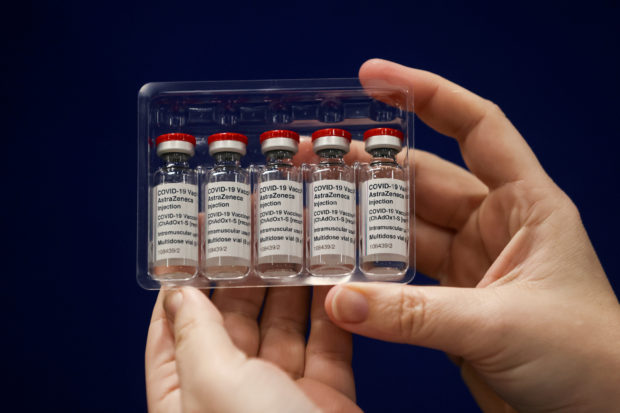Vaccine shock: S. Africa ends AstraZeneca shot on fears it doesn’t stop mild illness

FILE PHOTO: Vials with AstraZeneca’s coronavirus disease (COVID-19) vaccine are seen at the vaccination center in the Newcastle Eagles Community Arena, in Newcastle upon Tyne, Britain, January 30, 2021. REUTERS/Lee Smith
LONDON — South Africa halted the rollout of AstraZeneca’s Covid-19 vaccinations after data showed it gave minimal protection against mild infection from one variant, stoking fears of a much longer cat-and-mouse battle with the pathogen.
The novel coronavirus has killed 2.3 million people and turned normal life upside down for billions but new variants of the virus have raised fears that vaccines will need to be tweaked and people may have to have booster shots.
Researchers from the University of Witwatersrand and the University of Oxford said in a prior-to-peer analysis that the AstraZeneca vaccine provided minimal protection against mild or moderate infection from the so-called South African variant among young people.
“This study confirms that the pandemic coronavirus will find ways to continue to spread in vaccinated populations, as expected,” said Andrew Pollard, chief investigator on the Oxford vaccine trial.
“But, taken with the promising results from other studies in South Africa using a similar viral vector, vaccines may continue to ease the toll on health care systems by preventing severe disease.”
The AstraZeneca vaccine was the big hope for Africa as the continent hoped the shot – which is easier to store and transport than the Pfizer vaccine – so halting its rollout in South Africa is a major blow.
An analysis of infections by the South African variant showed there was only a 22% lower risk of developing mild-to-moderate Covid-19 versus those given a placebo.
If vaccines do not work as effectively as hoped against new and emerging variants, then the world could be facing a much longer and more expensive battle against the virus than previously thought.
While thousands of individual changes have arisen as the virus mutates on replication and evolves into new variants, only a tiny minority are likely to be important or change the virus in an appreciable way, according to the British Medical Journal.
Vaccine shock
While the lead investigator on the trial said that recent data indicated that protection against severe disease was likely from the vaccine, the study raised the prospect of repeated vaccination against a changing virus.
Professor Shabir Madhi, lead investigator on the AstraZeneca trial in South Africa, said the vaccine’s similarity to another produced by Johnson & Johnson, which reduced severe disease by 89%, suggested it would still prevent serious illness or death.
“There’s still some hope that the AstraZeneca vaccine might well perform as well as the Johnson & Johnson vaccine in a different age group demographic that I address of severe disease,” he told BBC radio.
Sarah Gilbert, professor of vaccinology at the University of Oxford, said efforts were underway to develop a new generation of booster shot vaccines that will allow protection against emerging variants.
“This is the same issue that is faced by all of the vaccine developers, and we will continue to monitor the emergence of new variants that arise in readiness for a future strain change,” she said.
UK is ‘confident’
The AstraZeneca COVID-19 vaccine prevents death and serious illness and is effective against the main variants of the virus in the United Kingdom, though people may have to have a booster shot as it mutates, a junior health minister said on Monday.
“There is no evidence that this vaccine is not effective in preventing hospitalization and severe illness and death, which ultimately is what we’re seeking with these vaccines today,” British junior health minister Edward Argar told Sky.
“The dominant strains in this country are not the South African strain, there are a small number of cases of that, the dominant strains here are the historic one we’ve had, and then the Kent variant, against which this vaccine is highly effective.”
Argar said just 147 people had been known to have been infected with the South African variant in Britain, though he allowed that booster shots – such as against the common flu – might be needed in the future as the virus mutates.
“It would just be normal in a sense as we did with the flu vaccine to update it to catch anything the virus is trying to do to keep ahead of it,” he said.
For more news about the novel coronavirus click here.
What you need to know about Coronavirus.
For more information on COVID-19, call the DOH Hotline: (02) 86517800 local 1149/1150.
The Inquirer Foundation supports our healthcare frontliners and is still accepting cash donations to be deposited at Banco de Oro (BDO) current account #007960018860 or donate through PayMaya using this link.